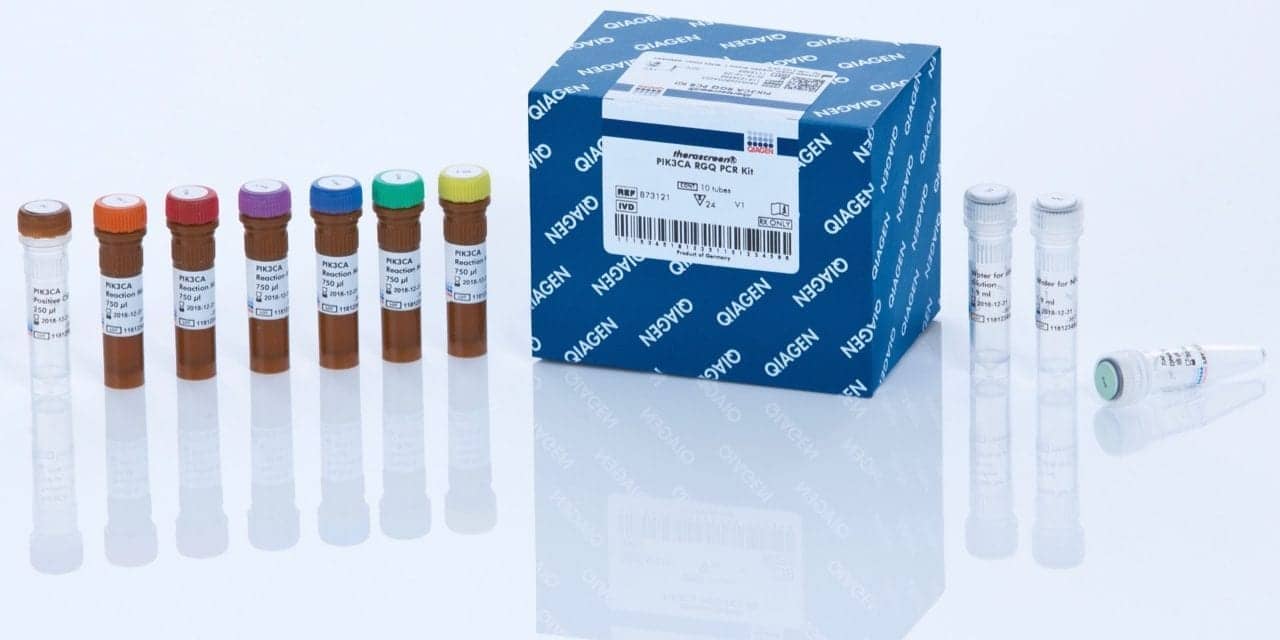FDA has approved Piqray (alpelisib) tablets from Novartis, Basel, Switzerland, for use in combination with the FDA-approved endocrine therapy fulvestrant to treat postmenopausal women and men with hormone receptor-positive (HR+), human epidermal growth factor receptor 2-negative (HER2–), PIK3CA-mutated, advanced, or metastatic breast cancer.
Use of the combination therapy requires detection of the patient’s status by an FDA-approved test, following progression on or after an endocrine-based regimen.
In conjunction with its approval of the new therapy, FDA also approved the Therascreen PIK3CA RGQ PCR kit from Qiagen, Hilden, Germany, and Germantown, Md, as a companion diagnostic for the detection of PIK3CA mutation in a tissue or liquid biopsy. Patients who are negative by the Therascreen test using liquid biopsy should undergo tumor biopsy for PIK3CA mutation testing.
“Piqray is the first PI3K inhibitor to demonstrate a clinically meaningful benefit in treating patients with this type of breast cancer. The ability to target treatment to a patient’s specific genetic mutation or biomarker is becoming increasingly common in cancer treatment, and companion diagnostic tests assist oncologists in selecting patients who may benefit from these targeted treatments,” says Richard Pazdur, MD, director of FDA’s oncology center of excellence and acting director of the Office of Hematology and Oncology Products in FDA’s Center for Drug Evaluation and Research.
“For this approval, we employed some of our newer regulatory tools to streamline reviews without compromising the quality of our assessment,” adds Pazdur. “This drug is the first novel drug approved under the real-time oncology review pilot program. We also used the updated assessment aid, a multidisciplinary review template that helps focus our written review on critical thinking and consistency and reduces time spent on administrative tasks.”
When breast cancer is hormone-receptor positive, patients may be treated with antihormonal treatment, also called endocrine therapy, alone or in combination with other medicines or chemotherapy. The efficacy of Piqray was studied in the Solar-1 trial, a randomized trial of 572 postmenopausal women and men with HR+, HER2– advanced or metastatic breast cancer whose cancer had progressed while on or after receiving an aromatase inhibitor.1 Results from the trial showed that the addition of Piqray to fulvestrant significantly prolonged progression-free survival (median of 11 months versus 5.7 months) in patients whose tumors had a PIK3CA mutation.
For further information, visit Novartis.
Reference
- André F, Ciruelos EM, Rubovszky G, et al. Alpelisib (ALP) + fulvestrant (FUL) for advanced breast cancer (ABC): results of the phase III Solar-1 trial [presidential symposium 1, abstract LBA3_PR, online]. Presentation at the 2018 annual congress of the European Society for Medical Oncology, Munich, Germany, October 19–23, 2018. Ann Oncol. 2018;29(suppl 8). Available at: https://oncologypro.esmo.org/meeting-resources/esmo-2018-congress/alpelisib-alp-fulvestrant-ful-for-advanced-breast-cancer-abc-results-of-the-phase-3-solar-1-trial. Accessed July 22, 2019.
Featured image:
The Therascreen PIK3CA RGQ PCR kit from Qiagen.






